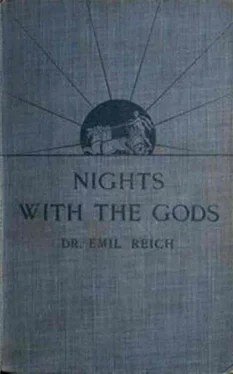Emil Reich - Nights with the Gods
Здесь есть возможность читать онлайн «Emil Reich - Nights with the Gods» — ознакомительный отрывок электронной книги совершенно бесплатно, а после прочтения отрывка купить полную версию. В некоторых случаях можно слушать аудио, скачать через торрент в формате fb2 и присутствует краткое содержание. Жанр: unrecognised, на английском языке. Описание произведения, (предисловие) а так же отзывы посетителей доступны на портале библиотеки ЛибКат.
- Название:Nights with the Gods
- Автор:
- Жанр:
- Год:неизвестен
- ISBN:нет данных
- Рейтинг книги:5 / 5. Голосов: 1
-
Избранное:Добавить в избранное
- Отзывы:
-
Ваша оценка:
- 100
- 1
- 2
- 3
- 4
- 5
Nights with the Gods: краткое содержание, описание и аннотация
Предлагаем к чтению аннотацию, описание, краткое содержание или предисловие (зависит от того, что написал сам автор книги «Nights with the Gods»). Если вы не нашли необходимую информацию о книге — напишите в комментариях, мы постараемся отыскать её.
* Aristotle on Specialism in England
* Diogenes and Plato on Tolstoy, Ibsen, Shaw, etc.
* Alcibiades on Women in England
* Caesar on The House of Commons
* Apollo and Dionysus in England
* Socrates, Diogenes, and Plato on Religion
Nights with the Gods — читать онлайн ознакомительный отрывок
Ниже представлен текст книги, разбитый по страницам. Система сохранения места последней прочитанной страницы, позволяет с удобством читать онлайн бесплатно книгу «Nights with the Gods», без необходимости каждый раз заново искать на чём Вы остановились. Поставьте закладку, и сможете в любой момент перейти на страницу, на которой закончили чтение.
Интервал:
Закладка:
"I listened very attentively, but could not understand a word of what he said. He treated me text-critically, philologically, hermeneutically,—everything, except understandingly. I felt that my treatise was not mine at all. It was his. At a given moment I could not help uttering aloud a sarcastic remark about the professor's explanations. Down he came on me like thunder, and with a triumphant sneer he proved to me that what I had said I had not said at all. In that I differed entirely from a great statesman of theirs, who had said what he had said. The professor put me under a regular examination, and after twenty minutes formally ploughed me in 'De Anima.'
"This was a novel experience for me. In the Middle Ages, it is true, I had repeatedly had the same experience, and Albertus Magnus and St Thomas Aquinas had done me the same honour. But in modern times I had not yet experienced it. The next day I called upon the professor, who lived in a beautiful house, filled with books, amongst which I saw a great number of editions of my own works.
"I asked him whether he had ever cared to study the anima, or what they call the psychology of animals. I added that Aristotle had evidently done so, as his works explicitly prove, and that after he had surveyed all sorts of souls in the vegetable, animal and human kingdom, both normal and pathological, he wrote his treatise 'De Anima,' the real sense of which must escape him who has not taken such a wide range of the question. Ah—you ought to have seen the professor! He jumped from his seat, took another whisky and soda and said: 'My young friend, the first thing in science is to distinguish well. Bene docet qui bene distinguit. You speak of animals. What have they to do with human psychology? Their souls are studied by my colleague who goes in for comparative psychology; or rather by several of my colleagues, one of whom studies the comparative psychology of the senses; the other that of the emotions; the third that of memory; the fourth—the fifth—the sixth, etc., etc., etc.
"'I, I stick to my point. I have my speciality. You might think that my speciality is psychology, or Aristotle's psychology. Not at all. This is all too vague, too general. My speciality is quite special; a particularly singular speciality: the text of Aristotle's psychology. And even that goes too far; for what I really call my speciality is my version of the text which is said to have been written by Aristotle.
"'Now at last we are on firm ground. What under those conditions need I trouble about cats and rats? The latter, the rats, have, I admit, some little importance for me. They have in their time devoured parts of Aristotle's manuscripts, and I have now to reconstitute what they have swallowed. I am to them a kind of literary Beecham's Pill. But as to cats, mules or donkeys? What have they to do with me? Can they influence my version of the text? Hardly.
"'My young friend, if Aristotle himself came to me, I should tell him: "My good man, unless you accept my version of your text, you are out of court. I am a professor, and you are only an author. Worse than that—a Greek author. As theologians fix the value and meaning of gospel-words; as the State makes a piece of worthless paper worth five pounds sterling by a mere declaration; even so we say what you Aristotle did say. What you said or meant is indifferent; what we say you said or meant is alone of consequence." How then could even Aristotle refute me regarding my view of his views? It is logically impossible.
"'Don't you see, this is why we have invented our beautiful system of excessive specialisation. Where each of us studies only one very small thing, there he need not fear much competition, but may hope for exclusive authority. We shall soon establish chairs for professors of philosophy, who will study, each of them, just a mere splinter of a twig of one branch of the tree of philosophy; or better still, just one leaf of such a twig of such a branch; and finally, just a dewdrop on such a leaf of such a twig of such a branch. Then we shall have completed our network of authority.
"'Our contemptible enemies say that our talk about Aristotle and Plato is like the gossip of lackeys in the pot-house about their noble masters. We know better. You are a young man. I will give you a bit of profound advice. If you want to make your way in the literary world rapidly and with ease, hitch on your name to some universally acknowledged celebrity. Do not write on obscure, if great authors or heroes; but pick out Homer, Plato, Dante, Shakespeare, Goethe, or Napoleon. Write constantly on some speciality of these men; thus, on the adjectives in Homer; on the neutral article in Plato; on the conjunctions in Dante; on the plant-lore in Shakespeare; on the names of women in Goethe; or on the hats of Napoleon.
"'Your name will then incessantly be before the public together with that of Homer or Shakespeare or Napoleon. After a time, by a natural association of ideas, something of the lustre of the immortal will fall on you. Note how the most elaborate writers on, say Shakespeare, are almost invariably men of the most sincere mediocrity. They are, nevertheless, exceedingly clever tacticians. They become "authorities." We are not authorities because we are specialists; we have, on the contrary, introduced the system of specialities in order to pass for authorities. To use Plato's terms: our whole business spells effectology, and nothing else. Take this to heart and be successful.'
"On leaving the professor," Aristotle said, "I felt that I had made several steps forward in the comprehension of that system of specialisation which I heard praised and admired in all the Universities. I need not tell you, my friends, how utterly wrong that system is. As humans do not think in words, but in whole sentences, so Nature does not act in particulars, but in wholes. The particulars are ours, not Nature's. In making them we act arbitrarily. Why should dentistry be one speciality? Why should there not be thirty-two different specialist dentists for our thirty-two teeth? All specialisation in the realm of knowledge is rank arbitrariness. Without exception, the great leading ideas in all organised thought have invariably been made by wholesale thinkers like Pythagoras, Plato, I venture to add: myself, Lionardo da Vinci, Kepler, Newton, Pascal, Leibniz, Darwin. That is precisely where humans differ from animals. All animals are the most conceited specialists."
Here Diogenes interrupted: "Does the converse hold good, O Aristotle?"
"I will leave," Aristotle replied with a smile, "the consideration of this case to your own discretion. I do repeat it, that each animal is an out-and-out specialist. It troubles about nothing else than the two or three things it takes a professional interest in. It eats, sleeps, and propagates; occasionally it adds a tightly circumscribed activity of some kind. That's why animals do not talk. It is not part of their speciality. They do not talk for the same reason that the English do not produce fine music, nor the Prussians tactful behaviour. In all these cases the interest of the specialist lies elsewhere.
"Does a modern specialist in heart-diseases study the kidneys? Does a specialist in surgery care to study the nerves? Even so an animal does not care to speak. It is a specialist; it restricts itself to its 'business,' to 'the point.' The little ones say that animals have no general ideas, and that is why they cannot speak. But have human specialists any general ideas of anything, and yet—do they not speak? The argument is too foolish for words.
"Why, Nature created men in order to have a few generalists, if I may say so, amongst all the specialists called animals or plants; just as amongst men she created Homers and Platos and Galileos and Leibnizes, in order to save the rest of humans from their evil tendency to over-specialisation. It is a plan as plain as transparent glass.
Читать дальшеИнтервал:
Закладка:
Похожие книги на «Nights with the Gods»
Представляем Вашему вниманию похожие книги на «Nights with the Gods» списком для выбора. Мы отобрали схожую по названию и смыслу литературу в надежде предоставить читателям больше вариантов отыскать новые, интересные, ещё непрочитанные произведения.
Обсуждение, отзывы о книге «Nights with the Gods» и просто собственные мнения читателей. Оставьте ваши комментарии, напишите, что Вы думаете о произведении, его смысле или главных героях. Укажите что конкретно понравилось, а что нет, и почему Вы так считаете.












